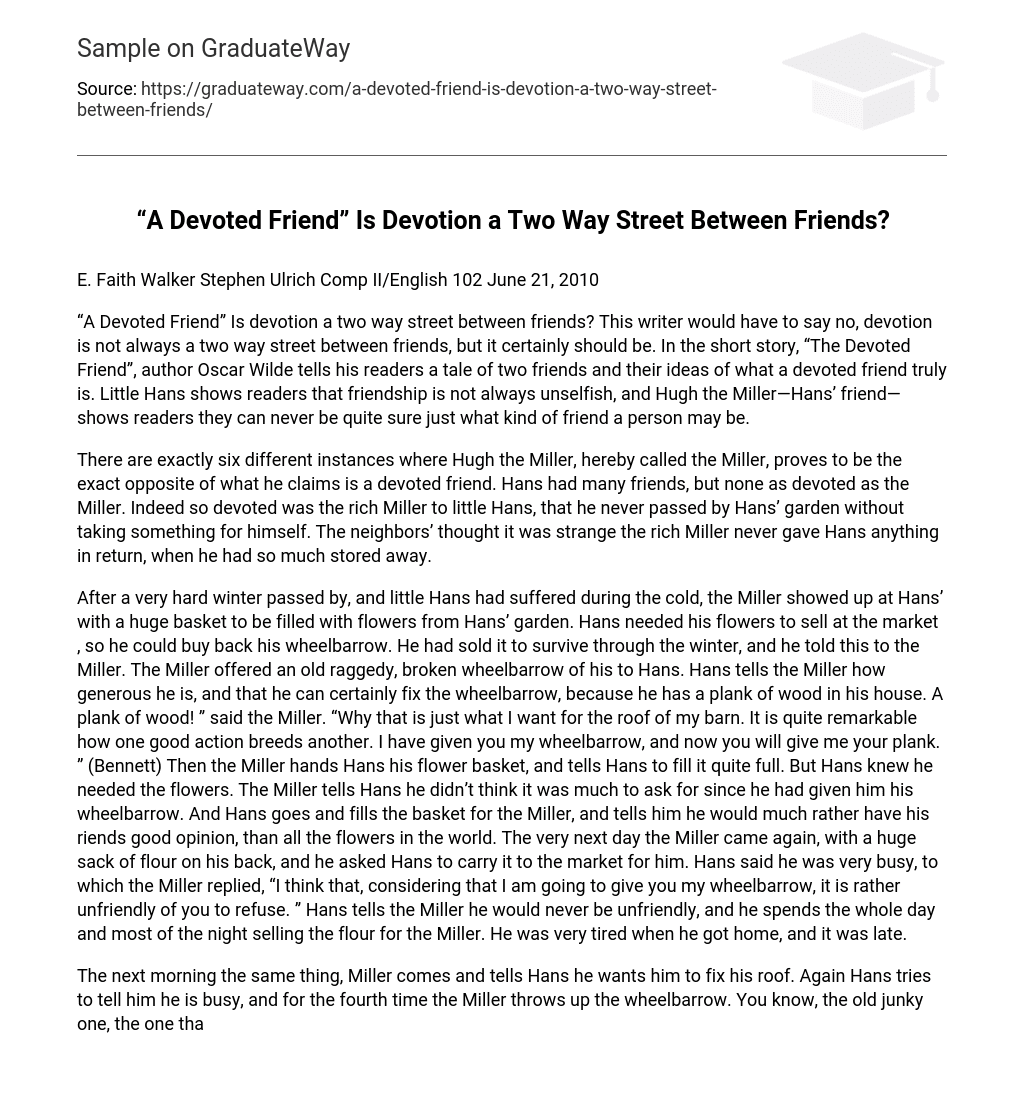In the short story, “The Devoted Friend”, author Oscar Wilde tells his readers a tale of two friends and their ideas of what a devoted friend truly is. Little Hans shows readers that friendship is not always unselfish, and Hugh the Miller—Hans’ friend—shows readers they can never be quite sure just what kind of friend a person may be.
There are exactly six different instances where Hugh the Miller, hereby called the Miller, proves to be the exact opposite of what he claims is a devoted friend. Hans had many friends, but none as devoted as the Miller. Indeed so devoted was the rich Miller to little Hans, that he never passed by Hans’ garden without taking something for himself. The neighbors’ thought it was strange the rich Miller never gave Hans anything in return, when he had so much stored away.
After a very hard winter passed by, and little Hans had suffered during the cold, the Miller showed up at Hans’ with a huge basket to be filled with flowers from Hans’ garden. Hans needed his flowers to sell at the market , so he could buy back his wheelbarrow. He had sold it to survive through the winter, and he told this to the Miller. The Miller offered an old raggedy, broken wheelbarrow of his to Hans. Hans tells the Miller how generous he is, and that he can certainly fix the wheelbarrow, because he has a plank of wood in his house. A plank of wood! ” said the Miller. “Why that is just what I want for the roof of my barn. It is quite remarkable how one good action breeds another. I have given you my wheelbarrow, and now you will give me your plank. ” (Bennett)
Then the Miller hands Hans his flower basket, and tells Hans to fill it quite full. But Hans knew he needed the flowers. The Miller tells Hans he didn’t think it was much to ask for since he had given him his wheelbarrow. And Hans goes and fills the basket for the Miller, and tells him he would much rather have his riends good opinion, than all the flowers in the world. The very next day the Miller came again, with a huge sack of flour on his back, and he asked Hans to carry it to the market for him. Hans said he was very busy, to which the Miller replied, “I think that, considering that I am going to give you my wheelbarrow, it is rather unfriendly of you to refuse. ” Hans tells the Miller he would never be unfriendly, and he spends the whole day and most of the night selling the flour for the Miller. He was very tired when he got home, and it was late.
The next morning the same thing, Miller comes and tells Hans he wants him to fix his roof. Again Hans tries to tell him he is busy, and for the fourth time the Miller throws up the wheelbarrow. You know, the old junky one, the one that Hans still needed. So Hans goes and fixes the roof, and again it takes all evening. When he finished the Miller told him to go home , and get plenty of rest because he needed Hans to drive his sheep up the mountain in the morning. So for the fifth time Hans spends his whole day helping the Miller.
He was so tired when he returned home he fell out in his chair thinking about working with his flowers. Hans never got the chance to look after his flowers, for the Miller was always coming around to find something Hans could do for him. Now it happened one evening that the Miller came banging on Hans’ door. When Hans opened the door he saw a lantern in one of the Miller’s hands, and a big stick in the other. The Miller tells Hans that his son has fallen off of a ladder, and was hurt badly. He said he was going out for the doctor but the doctor lived so far away and it was such an awful night.
And so it had occurred to him, it would be much better if Hans were to go for him. Hans tells the Miller he will certainly go, but the Miller needed to lend him his lantern since it was so dark. The Miller tells Hans he is sorry, but it is a new lantern and would be a great loss if something were to happen to it. So Hans sets off for the doctor in the dark with the rain pouring down, and after three hours he reached the doctor. He explained what happened to the Miller’s son, and the doctor sets off on his horse to the Miller’s with Hans trudging behind him.
Hans drowned that night. The Miller was the chief mourner. After the funeral he began telling everyone there how great of a loss Hans’ death was to him, and how he had all but given Hans his wheelbarrow. “I will certainly take care not to give away anything again,” says the Miller, “one always suffers for being so generous. ” (Wilde) This story is a fairy tale for young readers, but is loved by all. It has brought out some moral issues about friendship, what it means, and how beautiful phrases about it can be used for evil purposes.
The story shows how one man can take advantage of another’s innocence, to do things for his own benefits. (Chan) When friendship is involved it is important to be careful how one treats his/her friends, and how they might share their things. Because what one gives to his/her friend, is what their friend is going to receive.





